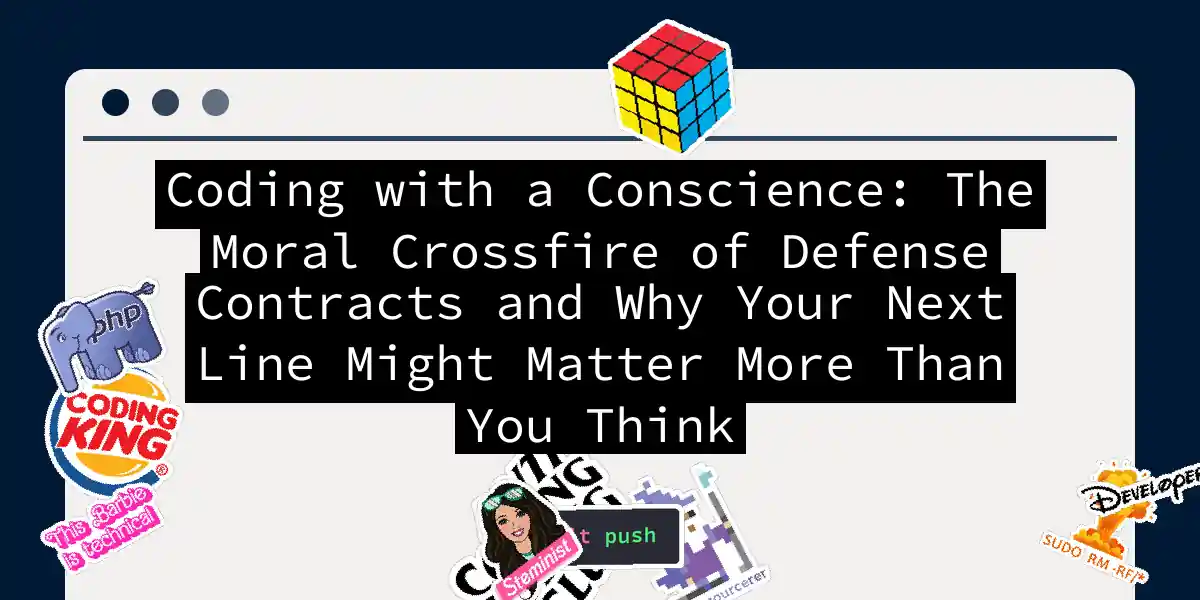As programmers, we’re constantly reminded that “code is law” – but what happens when the code we write becomes part of the legal arsenal of a war machine? In this article, we’ll dissect the uncomfortable truths behind defense contracting, why this decision should haunt your nightmares, and explore practical steps to navigate this ethical minefield.
The Devil’s in the Documentation
Defense contracts aren’t just about building APIs – they involve navigating a labyrinth of regulations like DFARS that could make even the most seasoned developer weep. Let’s dissect a sample compliance check function that would make HR departments cringe:
def is_compliant(activity: str) -> bool:
"""Function to determine if defense-related work should be avoided
Based on hypothetical ethical thresholds"""
red_flag_keywords = ["surveillance", "drone", "cruise", "missile", "cyberweapon"]
compliance_threshold = 0.7 # Arbitrary "danger" level
# Pseudocode for risk assessment
keywordHits = sum(1 for kw in red_flag_keywords if kw in activity.lower())
return keywordHits / len(red_flag_keywords) >= compliance_threshold
While this function is a simplification, it illustrates the tension between technical problem-solving and ethical boundary-checking. The real challenge lies not in code execution, but in the contractual context that few developers get to examine.
The Hidden Costs of “Just” Building the Tools
Defense contractors face unique moral hazards. From , we learn about the production phase where profit motives conflict with public safety. When you work on defense systems, you’re not just writing code – you’re building components of a system that might:
| System Component | Potential Misuse | Ethical Consideration |
|---|---|---|
| Encryption modules | Secure communications | Protecting state secrets vs enabling authoritarian surveillance |
| Predictive analytics | Threat detection | Mass surveillance or privacy erosion |
| Explosive trigger code | Precision targeting | Civilian harm in combat zones |
Practical Steps for Ethical Decision-Making
- Read the Fine Print: Defense contracts often require working with classified specs. Consider implementing a personal “moral triage” system:
- Buildachsen a Radical Transparency Practice:
# Pseudocode for ethical contract analysis def ethical_sweatshop(contract_text): for clause in contract_terms: if "weapons" in clause or "classified" in clause: return EthicalRiskWarning[High] return SafeToProceed[Low] - Create a personal “Red Flag” checklist:
- Does the contract specify weaponized applications?
- Are you being asked to bypass ethical review processes?
- Will this system potentially cause civilian harm?
- Leverage Professional Organizations: Industry groups like SINTEF or IEEE provide ethical guidelines, though defense work often exists in a gray area between national security and personal morality.
The Agonizing Dilemma: When the Code “Needs” You but Your Conscience Squeals
Let’s imagine Heidi, a frontend developer being asked to build a UI for drone targeting systems. She has student loans to pay but recalls ’s warning about the “line in the sand” of integrity. Her internal debate might look like this: Pro Defense Contract:
- Job stability and increased pay
- “Someone else would do it anyway” rationale
- National security argument
Anti Defense Contract: - Hypothetical future misuses of the technology
- Personal anti-war stance
- Damage to personal brand as “conscience coder”
Alternative Pathways: Building for Peace Instead
Rather than boycotting outright, consider redirecting efforts to dual-use technologies with clearer ethical boundaries. For example:
| Precision Agriculture | Homeland Security | Civilian Infrastructure |
|---|---|---|
| Drone crop monitoring | Border surveillance | Disaster response systems |
| Environmental sensors | Surveillance tech | Smart grid control |
| Predictive analytics | Weapon targeting | Public health tracking |
Final Thoughts: Choosing Your Moral Poison
The uncomfortable truth is that every line of code has consequences, and defense contracts force you to reckon with them whether you like it or not. This isn’t about being a pacifist or an ideologue – it’s about becoming the architect of your own professional integrity. Should you join the boycott? Maybe. Should you engage? Sometimes. But what’s non-negotiable is that you must choose knowingly. The age of “I just code what they pay me to” is over. From debugging to moral scrubbing, the developer’s dilemma has never been clearer.
